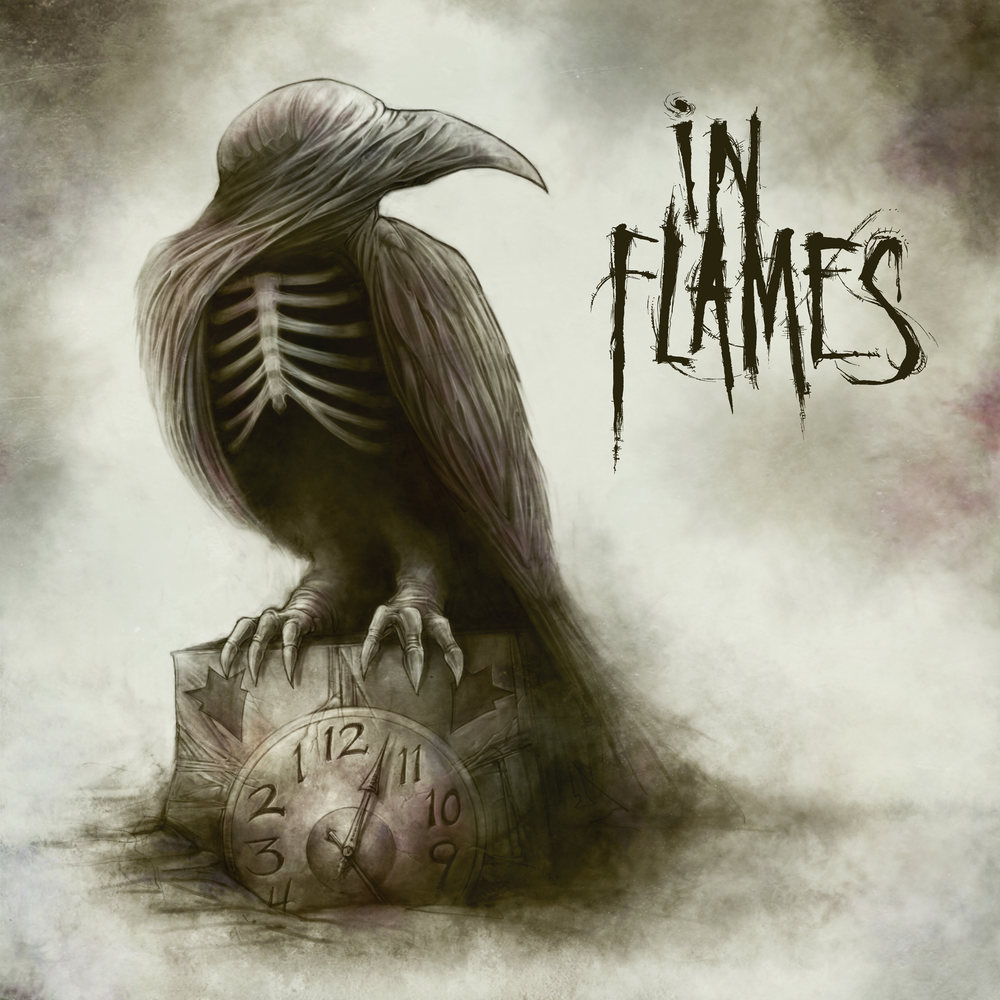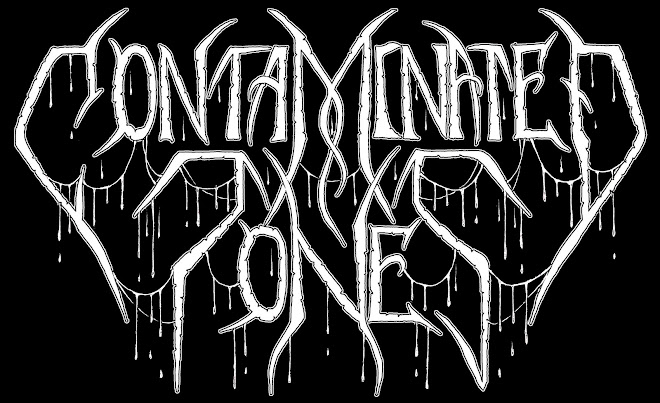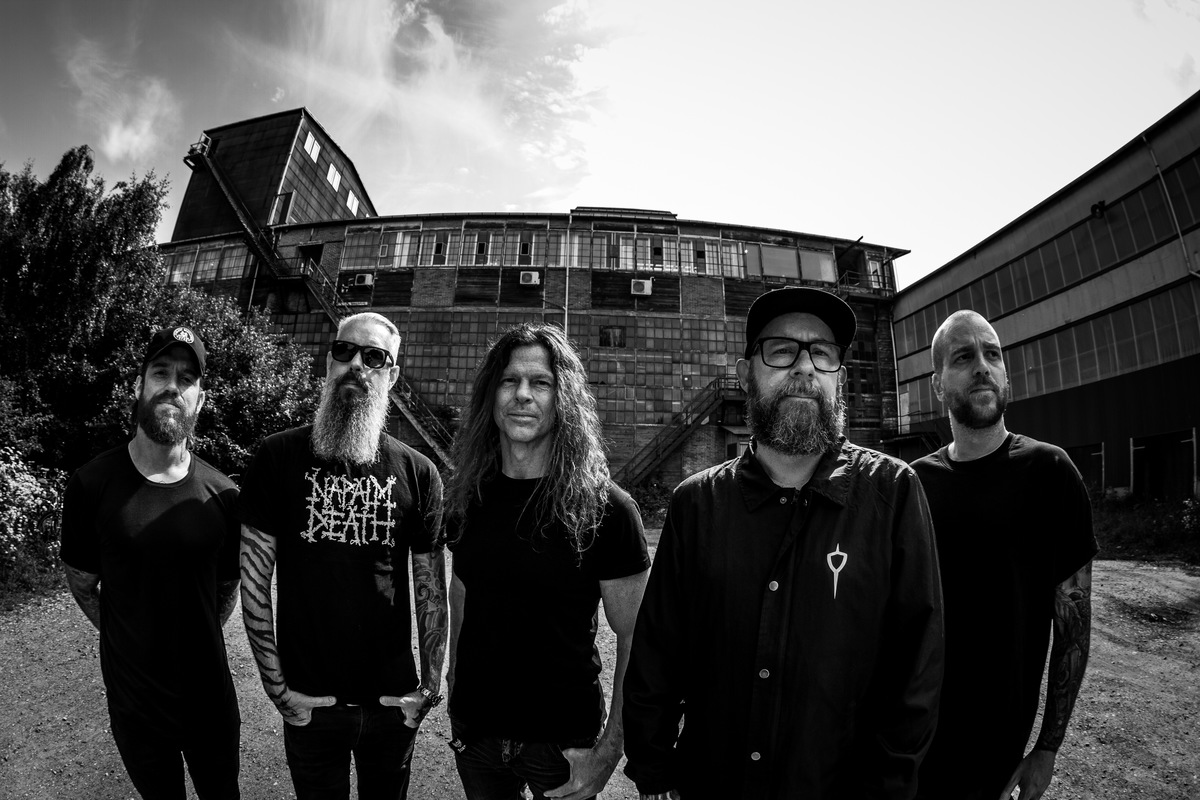Nobody has a reputation and following quite like In Flames. Jesper Stromblad formed the band with a vision of blending death metal with Iron Maiden-style harmonies, brought it to life by borrowing members from other bands, created a unique sound by writing with the band as a third guitarist while playing drums live. Their first album was as disorganized as the band's lineup at the time, but it was an interesting and revered combination of harmony-filled death metal, with folk songs and passages and the odd inclusion of a violin at times, several steps closer to mastering the inclusion of that instrument than At The Gates, who reportedly only included violinist Jesper Jarold on their debut when a public image campaign in Sweden required all metal bands to have a member named Jesper.
From there, band underwent a transformation from side project to full-time band, creating an EP that even naysayers of their style often admit to enjoying - these sessions utilized two drummers and five vocalists who weren't on the debut and would be out of the picture by the next album. Tired of the revolving door, the band established a stable lineup in 1995.
From there, the band pinned down their classic style, a heavily layered, extremely melodic version of heavy/power metal with low tuned guitars and a growling vocalist. For their next album, they stripped down the sound to be more aggressive and rely on fewer layers, with more string skipping like their peers At The Gates. Following some lineup shifts, they took a turn back towards their 80s roots with some keyboards and a hammond organ on their next release, starting to give the vocalist a bit of room to expand from a monotone. From there, they successfully reinvented their style one last time, aided by a legendary production job with one of the thickest guitar sounds on a palatable metal album, and ushered in a new Swedish sound, something that would come to be hated as it was never as good as the first time, only a bastardization of those serene songs that those bastards from Gothenburg once played.
While the band had not completely reinvented itself from one album to the next, they took so many of the right steps to stay close to home but offer a different outlook each time. This reputation followed them for years to come, knowing that a band who had so much great material to fall back on could always revisit portions of it and come away with something good. As Nuclear Blast signed In Flames clones from Germany and bands flocked to Studio Fredman for "the sound", In Flames opted for a change of wardrobe, building makeshift studios in a rented house overseas, and most fans these days refer to a spiritual change known as "being dead inside".
The band phased out their old material citing the need for songs that were written for two guitarists, and they stripped down their once elegant arrangements to the point where the chugging and grooves were unaccompanied by melodies most of the time, only the increasingly wretched shrieks of their vocalist, who was born again at the turn of the millennium and believed that he could sing. The band did not abandon their old sound, rather they used its elements sparingly and spoke of them as a touch of the old stuff.
The band's legacy followed them in an odd way. With each coming album, their older fans appeared increasingly delusional about the band having some sort of return to form. They donned all-white outfits along with fellow Swedes Soilwork as they both released breakout albums in 2002. When they began rotating normal clothing back into their wardrobes on the second round of touring in support of this album, fans thought they were going to take a turn in direction. The frontman got his nu-metal out through a side project, Passender. Like the title of a song on their previous record, the band started a free fall and their next album was even more atrocious.
Then the band announced their intent to self-produce their next album. Surely they had tired of the synths dominating their sound, and with two guitarists producing, they would put out something like a catchier version of Clayman. Nope. It wasn't as bad as the last one, so that must be an upswing, right? The keyboards were used a bit more sparingly (much like fats, oils, and sweets are used sparingly in the American diet) so that meant they wanted to write more guitar-oriented music again, right? The guitarists even mentioned that they wanted to focus on the guitars more, more like the old stuff. For some reason, the band continued to suggest, here and there, that they had "the old stuff" in mind, which meant something very different to them and to the fans of the old stuff, some of whom still had hope in the band.
Their next album was more guitar-oriented, the music backed off the keyboards, and it was a lot better than the few before it. It was still nothing like the In Flames of days past, but they were headed in a better direction. Following this album, the last remaining founder of the band, Jesper Stromblad, announced his departure. Cue wild speculation. Perhaps losing him was the kick in the ass the band needed to get out of this awful groove, in more ways than one. The band wouldn't add another guitarist for the next album, though we all knew that perennial fill-in Niklas Engelin would get the job. Not welcoming him into the fold immediately suggested that they wanted something other than the nu-metal stylings of his other band, Engel.
...and then they announced the title of the album, and the whole world thought of the cover of Korn's self-titled debut.
-
A child runs through the playground pulling an unusual balloon by a ribbon. The ribbon, wrapped tightly around the child's hand, is also wrapped tightly around the lips of a frog, inflated with helium until it is round and buoyant in the air. The child climbs a ladder, still clutching the ribbon. Upon reaching the highest point on the playground, the child falls to the ground and pulls the ribbon so hard that it comes off of the frog. The helium-filled frog begins croaking, droning as it flies around like a deflating balloon. No, this is just an illusion, a wish that a once mighty band did not fall from the top and roll around in the dirt while their vocalist crooned like helium-filled frog. A dream that the band's once amazing logo had not been replaced by one with text written inside monkey bars, replaced by a stock font, replaced by some scratch that looks like a child's handwriting. Oh, the writing was on the wall, the writing was on the album cover before this one, we should have known.
-
Three major problems arise amidst a myriad of problems that constitute the problem that is this album. The band tried to make a vocal-driven album and they don't have the personnel to manage it. There are too many keyboards for a band without a keyboard player, and they write songs that use them as a crutch or a veil. I know the band are huge fans of Rush, but I no longer have the faith that In Flames can return to form from their crappy keyboard albums. Finally, the bread and butter of In Flames, the guitar riffs, have ceased to be, replaced by a descendant, the derivative of a derivative of the real In Flames.
 In Flames stated that they intended to make a vocal-driven album. In theory, that could work if their vocalist could sing, but Anders Friden's croaky crooning can only work as a percussive counterpart to melodic guitars. Long gone are the emotive monotone growls with three guitar parts layered over them. The third guitar is long gone too, and the guitars often lay back with power chords to leave room for vocals and keyboards. Their past success stories were largely in part due to great guitar work giving the vocals a narrow range to work within. The sliding half-growls worked for a while, finding a compromise between a monotone and attempting to carry a melody. It just doesn't work here.
In Flames stated that they intended to make a vocal-driven album. In theory, that could work if their vocalist could sing, but Anders Friden's croaky crooning can only work as a percussive counterpart to melodic guitars. Long gone are the emotive monotone growls with three guitar parts layered over them. The third guitar is long gone too, and the guitars often lay back with power chords to leave room for vocals and keyboards. Their past success stories were largely in part due to great guitar work giving the vocals a narrow range to work within. The sliding half-growls worked for a while, finding a compromise between a monotone and attempting to carry a melody. It just doesn't work here.If there was a time for In Flames to make an album with lots of clean singing, it was around 1994, when they had a vocalist who could actually sing.
The keyboards are another problem. Örjan Örnkloo has been playing keyboards on every In Flames album for the past decade, with the keyboards becoming increasingly involved in the music, minus a slight dip on the previous album. Although the keyboards are a huge part of the modern In Flames sound, they don't have a keyboard player in the band, and they seem to write songs without a keyboard player being involved. The result of this are synths filling the space, trying to compensate for the inability of the vocals and replace the melodic driving force that the guitars stopped providing a while ago. The synths never take the lead, they don't have their own place in the music like their counterparts Dark Tranquillity integrated quite well a bit earlier than In Flames. Synths fill out the wall of sound as an afterthought to compensate for what the rest of the music can't do.
There was a time when In Flames used keyboards well, fitting them into the music of Colony, giving them some of their own sections as well as some backing time, while still keeping the focus of the album on melodic guitar riffs.
What happened to the guitars? In Flames appear to be in a constant battle to reduce the role of guitars in their music. In the early days they had three guitarists, down to two while using three guitar tracks per song, sometimes with additional harmonies. Over the years they stripped the guitar parts down to rarely include a third, then began to use both guitars in unison while adding keyboards over the top. The departure of Jesper Stromblad did not help at all, with the guitars only pulling out of power chord mode to play harmonies as the tail of riffs, or as a fill. I understand that the point of this record was to leave things wide open for the vocalist to take the lead. That was a poor choice.
Rather than the complex layers of melodies and harmonies that most people knew as the In Flames sound, the occasional leads here are thin, basic harmonies that sound more like throwaway riffs of the In Flames wannabes of a decade ago - those that earned unkind-sounding labels like "Gothencore". The melodies and harmonies are no longer an integral part of the riffs, and the riffs are no longer the style that everyone with two ears loves the band for. The guitar playing is a bunch of mid-paced chugging interspersed with unimaginative harmonized leads.
In Flames used to write great guitar riffs and let them carry the music. Apparently they are content to leave that behind even if it means that they put out a laughably bad album.
This same band once had vivid lyrics of their fantasy world, cryptic hymns of astronomy and mythology. Anders Friden crafted those concepts and the lyrics were penned by Niklas Sundin. Once Anders had a stronger grip on the English language, he moved on to writing introspective, personal lyrics. While I prefer the earlier lyrics, the latter of those were acceptable and helped shape the concept of the Clayman album. Some of the lyrics on this album aren't as bad as others, but it doesn't get much worse than the childish prose of "The Attic":
"There's someone in the attic / Building a strange machine / Never really seen him / But I think he works all day
Blinded by the world outside / I stay inside / Hardly know my name / But it's getting better by time
I saw something in the mirror / Someone's watching me / If I hide in the attic / They will never get to me
Found some rope on the floor / I have to build a trap / So I start on my machine / I am never to be seen"
This album also continues a practice that the band begun when they named an album "Reroute To Remain" - they started by leaving a not-so-subtle hint that their shift in style would be be reverted while penning songs such as "Dismiss the Cynics" - and on this album Anders penned his least eloquent lyrics since "lost my visual 'cause all you fucks are in my way":
"I say goodbye to you all at once / (I) don't dare to face you all alone.
I went from wreckage to world class / With a box of t-shirts and some records to sell,
But times have changed - I have to defend my actions. / The foundation crumbles and I have to leave.
Thanks for everything - I couldn't ask for more... / I say I love you all... as I vanish through the Jester's Door"
If these lyrics hadn't been so honest and straight forward, spoken over some awful new age techno, I would think this was the wreckage. Thanks for defending your actions, I am honestly glad that you made a good living for yourselves after you put out some great albums, and I have some lyrics to suggest for the next In Flames album:
"First five were world class / Next five sucked ass
Couldn't make it on hard work / So we dressed up with Soilwork
Stopped writing metaphors / Instead wrote a song called Metaphor
Our last founder tired of songcraft / So he quit the band to play World of Warcraft."


No comments:
Post a Comment